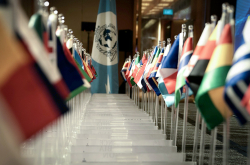Preparing for the future is essential for any organization, but especially so for law enforcement where proactive policing strategies are vital to facing a range of emerging crime challenges. To develop well-informed, forward-looking plans, law enforcement must use trusted methodologies which examine not only future threats but also new opportunities, to better understand their implications for policing.
INTERPOL is developing the first law enforcement-focused global horizon scan to help police interpret key trends which have the potential to either disrupt or assist their activities. The scan examines the future global landscape through the lens of six key areas:
Crime
What new forms of criminal activity are emerging now? What crimes of the future should police prepare for now?
Organization
What legacy and antiquated organizational models are keeping police and law enforcement in reactive modes? What new organizational models are needed to create more anticipatory policing and law enforcement organizational cultures? How will future policing look?
Society
How are the societies where police and law enforcement operate changing? How are global shifts in governance structures, processes and outcomes affecting police and law enforcement?
Environment
How might climate change affect police and law enforcement? What might be some of the effects from environmental issues, such as floods and fires, that police and law enforcement must be prepared to confront?
Economy
How are economic and financial trends shaping the future of policing and law enforcement? What economic indicators can police and law enforcement use to anticipate criminal activity?
Technology
What technologies can and should police and law enforcement adopt to enhance their work? How might criminals outpace police and law enforcement in adopting new and emerging technologies?
Objectives
- Introduce police worldwide to the concept of horizon scanning, as well as other future and foresight methodologies;
- Identify the key trends and phenomena which are likely to affect the future of law enforcement;
- Anticipate when and in what form these impacts might occur;
- Prioritize and localize the identified trends and their related implications, and create different products to share these outcomes with our member countries (such as scanning tools, trend cards, a futures game);
- Build a library of open source data and horizon scans conducted in all regions to serve as a global knowledge base.
Development process

- Existing open-source horizon scans produced by international think-tanks and other organizations are collected;
- The existing research is interpreted to identify key trends and phenomena, based on the key areas;
- The identified trends and phenomena are endorsed through various policing forums, such as our annual strategic event called ‘STRATalks’;
- INTERPOL and other experts provide analysis of the implications of these trends and phenomena for policing, based on INTERPOL’s priority crime programmes: counter-terrorism, cybercrime, and organized and emerging crime.
Related documents








